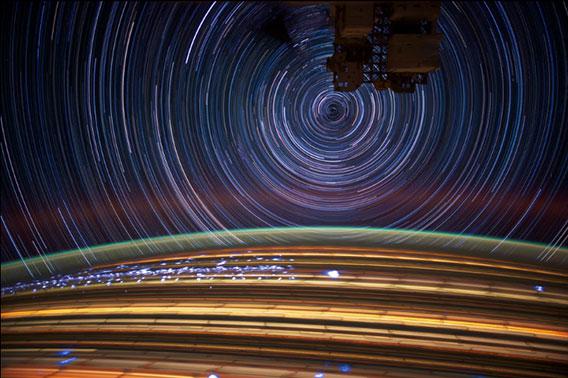I have posted quite a few time-lapse videos over the past couple of years; some of them straight astronomy, others of landscapes, and some made from still images taken by astronauts aboard the International Space Station. Of those last, ISS astronaut Don Pettit has taken many of the pictures used to create them. He has lived on the station twice, totaling very nearly a year on board the orbiting platform.
During that time he essentially perfected the art of the photography of the Earth, taking thousands upon thousands of separate, stunning images. I’ve met Don at a meeting, and his enthusiasm for photographing our home world from space is refreshing, heartfelt, and quite infectious.
Astrophotographer Christoph Malin was quite properly infected. Malin took thousands of individual photos by Pettit and animated them, adding clips of Pettit giving a talk about his stay aboard the ISS and his photography there. He also set it to music, creating what is simply one the best time-lapse videos I have ever seen. Seriously, set aside 16 minutes of your busy day, sit back, and soak this in: “The ISS Image Frontier”. You’ll want to make this full-screen.
When I first watched this, I was transfixed. I had seen some of the clips before, but usually in shorter videos. This longer format gave me more time to drink those in, and also could surprise me here and there with clips I hadn’t seen.
…but then, about halfway through, something amazing happened.
Many astronauts, even from back in the Apollo days, talk about an incredible feeling they get after a few days in space. As they gaze on the Earth from above, they lose their feeling of borders and nationality. The Saudi astronaut Sultan bin Salman Al-Saud, who flew on the Space Shuttle in 1985, commented on this, saying, “The first day or so we all pointed to our countries. The third or fourth day we were pointing to our continents. By the fifth day, we were aware of only one Earth.”
As I watched the video, I caught a brief glimpse of that feeling. As I watched the Earth glide by underneath, just watching it go past, I suddenly realized I had no idea what part of the planet I was seeing. Africa, America, Europe, Asia; I didn’t know, and more importantly, it didn’t matter. It was just Earth. But what struck me is I did recognize the stars, the familiar natural patterns of the northern summer constellations. For a moment, just a moment, I had the surpassingly extraordinary feeling that only the Universe mattered, not our names and labels and boundaries for it. I had never truly felt that before.
That moment was ephemeral, but the memory remains. The astronauts, who experience this for days, weeks, even months, must have that lingering sensation in their brain for a long, long time. I wonder if the lasting legacy of space travel won’t be the technology we gain, or the scientific knowledge acquired, but the feeling of community, of belonging to that planet, experienced at a visceral level.
How much woe would be averted if everyone could feel that, if even for only a moment?
